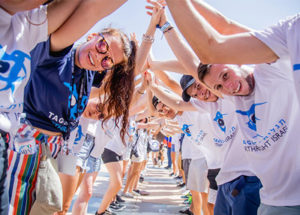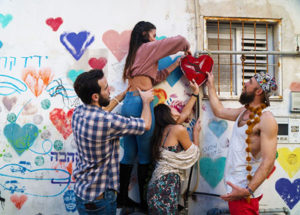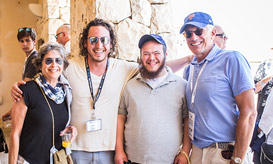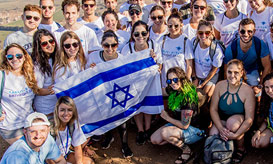Birthright Israel is excited to announce their first group arrived in Israel on May 24, 2021,…
As I doom-scrolled social media after the October 7 Hamas attack on Israel, in between photos of kidnapped and dead Israelis, I saw my Facebook friends showing their solidarity with Israel by posting grainy photos of their youthful faces and physiques in front of touristy backgrounds from their Birthright Israel trips. I suddenly realized what Birthright Israel’s founders knew all along: When a tragedy of this scale happens, the in-person connection to Israel is critical to preserving the country’s existence. Without this trip, I—like many other nonreligious Jews—would have been left on the sidelines right now, feeling unconnected from the events happening far away. For many of us, including myself, our Birthright Israel trip was the only time we’ve been to Israel. Though I vowed to come back soon, I still haven’t; had it not been for Birthright Israel, I may never have visited at all.
But I did. And so did hundreds of thousands of others. And now that the conflict has widened, and people are posting their opinions on social media, or attending rallies, or signing petitions, I can say that for me—and, I imagine, for many young Jewish adults—Birthright Israel worked. I feel connected. What’s happening in Israel and Gaza affects me in a way that wouldn’t be possible if I hadn’t spent time “on the bus.”
In late 2004, when I was 21 years old, I was preparing for a 10-day trip to see a country I’d never seen. The itinerary sounded exciting: the Dead Sea, Masada, the Wailing Wall, Bedouin tents. It was winter back home in Chicago, and I couldn’t wait to be in warmer weather. More pressingly for a college student (with journalism as my chosen profession), it was free.
Like many of my fellow Birthright Israel participants, I wondered if there was a catch. Could visiting Israel on this heritage trip result in a sort of one-sided view of the conflict that I wasn’t prepared for? (Prior to the trip, I only knew the basics about the conflict.) Would I be tempted to stay and live there? (I didn’t have a job lined up, so could be convinced to stay.) Become more religious? (I had immigrated to the U.S. from what’s now Ukraine as a child and grew up mostly secular.) Was there something I’d need to do to pay back the cost? I was suspicious. (And so was my family.) But it didn’t matter. The opportunity wasn’t one I was willing to pass up.
When I arrived in Israel with my group, it did not feel like just another trip abroad. I felt instantly welcomed and swept up in all the places we were to explore. I was also struck by just how secular many Israelis were and how cosmopolitan Tel Aviv felt. Looking around there were so many people who seemed exactly like me. Other times, I was more focused on helping my fellow travelers enjoy the bottles of vodka someone had thoughtfully purchased at duty free. A program, hosted toward the end of the trip, that gathered thousands of Birthright Israel participants under one roof was especially powerful. I extended my stay for a few days to spend time with family friends who live there.
While I was in Israel, I can’t claim to have encountered that sense of belonging I had heard others discuss. But I did get glimpses of it. During my time, I actively considered new ways of being Jewish, strengthening my resolve to light Shabbat candles each week. And the Jewish guilt of taking a free trip would sometimes take over: I vowed to at least donate the money they spent on my trip back to Jewish charities once I started working.
At the time, the trip also felt like overkill. As a Jew I felt that I would support other Jews whether I stepped foot on Israel’s soil or not. There was no need to spend thousands on an extravagant trip to ensure this. I wondered why the philanthropists in charge wouldn’t just spend these funds in other ways or donate the money to more lifesaving organizations.
Between the late nights and jet lag, the trip felt like a blur. And it did feel one-sided at times. But I returned to the U.S. not only feeling part of the larger community of Jews from around the world, but also closer to Israel.
Over the years, I’ve seen Birthright Israel references come up in many touching ways. A close friend met her husband on a trip—and later returned for their wedding. Another dear friend met her best friend on the trip. There are countless sweet stories like this, but the one constant was that everyone came away with a realization about themselves and their place in the world. For years, it also felt like a way to bond with other Jews my age. It was the ideal icebreaker. Everyone had a Birthright Israel story, it seemed.
In retrospect, I realize that I couldn’t quite grasp how important the trip was. Until now.
Thanks to Birthright Israel, the social posts I saw my friends post this month expressed solidarity in a way that felt authentic. And those 10 brief days continue to serve as a foundation for conversations among us. These were not just stories of traveling in your 20s.
It’s not any different for me. The names and landmarks I see on the news seem almost recognizable and allow me to care more deeply about the conflict. And the experience provided a backdrop for empathizing with the terrible deaths at the hands of Hamas, too.
The Birthright Israel trip also made it harder for me and others in the U.S. to just turn our backs. It’s the reciprocity principle, which means that we as humans always want to give something back when something is received.
The latest stats tell what a force Birthright Israel has become. Since 1999, more than 800,000 people have taken the trip, aimed at 18- to 26-year-olds. It’s now the “largest educational tourism organization in the world,” according to the website. For comparison, their alumni network is twice the size of Harvard’s, and it binds entire generations of Jews together.
In retrospect, there are major things I would have changed about my trip.
I wish that the organizers would have facilitated conversations with Arab Israelis, or that I took my own time to explore the conflict and history in a more nuanced way. That I learned more about the thousands of Palestinians crossing checkpoints each day to work inside Israel or the ones who were displaced in 1948. Aside from being surprised to encounter so many uniformed and armed soldiers, I left knowing very little about the ongoing conflict—I don’t blame the organizers; that was never their goal—but the trip forced me to dig deeper in the years that followed.
There are memories involved at every step, and that’s exactly the point. The backers, which include the Israeli government and a host of Jewish organizations, bet on the fact that there would be an especially grueling time when this kind of support would be critical. Unfortunately, that time is now. The trip was by no means perfect, but 20 years later, I’m thankful for those 10 days.













